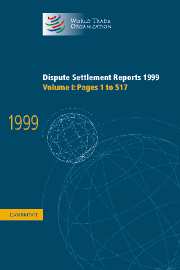Book contents
- Frontmatter
- Contents
- Korea - Taxes on Alcoholic Beverages (WT/DS75/AB/R, WT/DS84/AB/R, WT/DS75/R, WT/DS84/R,): Report of the Appellate Body
- Korea - Taxes on Alcoholic Beverages (WT/DS75/AB/R, WT/DS84/AB/R, WT/DS75/R, WT/DS84/R,): Report of the Panel
- Australia - Measures Affecting Importation of Salmon (WT/DS18/9): Award of the Arbitrator (under Art icle 21.3(c) DSU) Australia - Salmon
- Japan - Measures Affecting Agricultural Products (WT/DS76/AB/R, WT/DS76/R): Report of the Appellate Body
- Japan - Measures Affecting Agricultural Products (WT/DS76/AB/R, WT/DS76/R): Report of the Panel
- Cumulative Index of Published Disputes
Korea - Taxes on Alcoholic Beverages (WT/DS75/AB/R, WT/DS84/AB/R, WT/DS75/R, WT/DS84/R,): Report of the Appellate Body
Published online by Cambridge University Press: 22 December 2017
- Frontmatter
- Contents
- Korea - Taxes on Alcoholic Beverages (WT/DS75/AB/R, WT/DS84/AB/R, WT/DS75/R, WT/DS84/R,): Report of the Appellate Body
- Korea - Taxes on Alcoholic Beverages (WT/DS75/AB/R, WT/DS84/AB/R, WT/DS75/R, WT/DS84/R,): Report of the Panel
- Australia - Measures Affecting Importation of Salmon (WT/DS18/9): Award of the Arbitrator (under Art icle 21.3(c) DSU) Australia - Salmon
- Japan - Measures Affecting Agricultural Products (WT/DS76/AB/R, WT/DS76/R): Report of the Appellate Body
- Japan - Measures Affecting Agricultural Products (WT/DS76/AB/R, WT/DS76/R): Report of the Panel
- Cumulative Index of Published Disputes
Summary
INTRODUCTION
This is an appeal by Korea from certain issues of law and legal interpretation developed in the Panel Report, Korea - Taxes on Alcoholic Beverages. That Panel was established by the Dispute Settlement Body (the “DSB”) to examine the consistency of two Korean tax laws: the Korean Liquor Tax Law of 1949 and the Korean Education Tax Law of 1982, both as amended (the “measures”), with Article III:2 of the GATT 1994. The Liquor Tax Law imposes an ad valorem tax on all distilled spirits. The rate of that tax depends on which of the eleven fiscal categories a particular alcoholic beverage falls within. The Education Tax Law imposes a surtax on the sale of most distilled spirits, the rate of the surtax being a percentage of the liquor tax rate applied to the spirit in question. A detailed description of the operation of these two taxes is to be found at paragraphs 2.1 to 2.23 of the Panel Report.
The Panel considered claims made by the European Communities and the United States that the contested measures are inconsistent with Article III:2 of the GATT 1994 because they accord preferential tax treatment to soju, a traditional Korean alcoholic beverage, as compared with certain imported “western-style” alcoholic beverages. The Panel Report was circulated to the Members of the World Trade Organization (the “WTO”) on 17 September 1998. The Panel “reached the conclusion that soju (diluted and distilled), whiskies, brandies, cognac, rum, gin, tequila, liqueurs and admixtures are directly competitive or substitutable products.” The Panel also concluded that “Korea has taxed the imported products in a dissimilar manner and the tax differential is more than de minimis” and that “the dissimilar taxation is applied in a manner so as to afford protection to domestic production.” The Panel made the following recommendation:
We recommend that the Dispute Settlement Body request Korea to bring the Liquor Tax Law and the Education Tax Law into conformity with its obligations under the General Agreement on Tariffs and Trade 1994.
- Type
- Chapter
- Information
- Dispute Settlement Reports 1999 , pp. 3 - 43Publisher: Cambridge University PressPrint publication year: 2001
- 6
- Cited by

